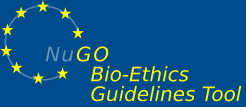- Home
- NuGO Guidelines
-
Definitions
-
Examples
-
Background
-
This is a static version of the NuGO Bioethics Guidelines Tool from 2007. Some links may be outdated. Searching is disabled. Please contact the authors for comments or questions
NuGO Guideline 1
Informed consent
Information during consent process
Information should be provided to the research volunteer in an adequate and comprehensive manner and should be documented. It is preferable to seek advice of experts in social sciences and communication, i.e. sociologists or psychologists, to optimize the information process.
The consenting process has to assure the participant understands:
- him or her being asked to participate in a nutrigenomics research project
- the voluntary nature of participation
- the differences between research and medical treatment and the limitation of the personal benefit
- necessary commitments arising from the participation in the research project.
Topics to be covered:
- the overall plan of the project (study design, sampling, sample and data processing)
- a statement whether repeated contact (see comment) of the research volunteer with the study team is envisaged
- the purposes, nature, extent and duration of the proposed use of the samples, including the possibility of genetic analyses
- the form of data storage and linkage for analysis (anonymized, coded, or identifiable, see Figure 1)
- the fate of samples and data when the study is finished, the consent is withdrawn, or participant dies
- a statement whether the sample will be stored after the study has finished; if stored, information should be given on possible further use and the research volunteer's right in that respect
- the research volunteer should have the possibility to indicate beforehand on a consent form the choices and restrictions (see comment) on the use of his/her biological material [see 50, Article 21]
- possible risks involved in the participation (medical, social, legal)
- opinion of the Ethics Committee
- where applicable: rights and safeguards prescribed by law for the protection of those who are not able to consent to research
- right to withdraw authorization at any time without being subject to any form of discrimination particularly regarding medical care
- the form in which research and test results will be communicated, which is of particular importance if the test results could be linked to the research volunteer's identity
- whether or not payment of expenses (e.g. reimbursement of costs for transportation) will take place
- circumstances under which the research volunteer will be re-contacted to renew the consent or circumstances under which no renewal of consent would be necessary for further research
- expected benefits of the research on the individual and societal level
- where applicable, any commercial prospects of the proposed research (including the possibility of filing patent applications on the results)
- in case of unlinked anonymization, the research volunteer needs to be informed that he or she can't make use of his or her right to know or not to know genotype information (unlinked, see Figure 1, see Figure 2).
- the extent of, and conditions for, the possible transfer of samples and data to a third party outside the institution e.g. in the framework of multi-centric studies (anonymized or coded only; see Figure 1)
- the voluntariness of participation
- the right to withdraw consent without any penalty
Informed consent is considered a process of communication between researcher and participant which starts before the research volunteer is recruited into the study and prevails during the ongoing study in an appropriate manner. There should always be enough space for answers to questions that might arise throughout the course of the study. In every study the participant should have a phone number and a name of a responsible research volunteer who could be contacted in case any question arises.
